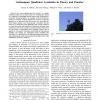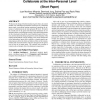55 search results - page 6 / 11 » Human error of commission modeled with Theory of Games |
IUI
2003
ACM
14 years 18 days ago
2003
ACM
We present a probabilistic model, based on Dynamic Decision Networks, to assess user affect from possible causes of emotional arousal. The model relies on the OCC cognitive theory...
SIGECOM
2008
ACM
13 years 7 months ago
2008
ACM
We report on an extensive series of highly controlled human subject experiments in networked trade. Our point of departure is a simple and well-studied bipartite network exchange ...
ICRA
2010
IEEE
13 years 5 months ago
2010
IEEE
— For many applications, the control of a complex nonlinear system can be made easier by modeling the system as a collection of simplified hybrid modes, each representing a part...
ATAL
2008
Springer
13 years 9 months ago
2008
Springer
We discuss the design of the Intermediary Agent's brain, the control module of an embodied conversational virtual peer in a simulation game aimed at providing learning experi...
HRI
2009
ACM
14 years 2 months ago
2009
ACM
This paper explores the use of an outcome matrix as a computational representation of social interaction suitable for implementation on a robot. An outcome matrix expresses the re...


